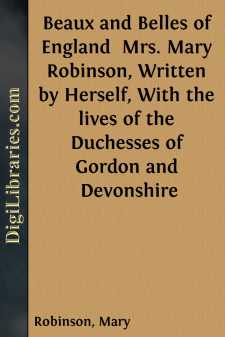Categories
- Antiques & Collectibles 13
- Architecture 36
- Art 48
- Bibles 22
- Biography & Autobiography 813
- Body, Mind & Spirit 142
- Business & Economics 28
- Children's Books 15
- Children's Fiction 12
- Computers 4
- Cooking 94
- Crafts & Hobbies 4
- Drama 346
- Education 46
- Family & Relationships 57
- Fiction 11828
- Games 19
- Gardening 17
- Health & Fitness 34
- History 1377
- House & Home 1
- Humor 147
- Juvenile Fiction 1873
- Juvenile Nonfiction 202
- Language Arts & Disciplines 88
- Law 16
- Literary Collections 686
- Literary Criticism 179
- Mathematics 13
- Medical 41
- Music 40
- Nature 179
- Non-Classifiable 1768
- Performing Arts 7
- Periodicals 1453
- Philosophy 64
- Photography 2
- Poetry 896
- Political Science 203
- Psychology 42
- Reference 154
- Religion 513
- Science 126
- Self-Help 84
- Social Science 81
- Sports & Recreation 34
- Study Aids 3
- Technology & Engineering 59
- Transportation 23
- Travel 463
- True Crime 29
Beaux and Belles of England Mrs. Mary Robinson, Written by Herself, With the lives of the Duchesses of Gordon and Devonshire
by: Mary Robinson
Description:
Excerpt
The author of these memoirs, Mary Robinson, was one of the most prominent and eminently beautiful women of her day. From the description she furnishes of her personal appearance, we gather that her complexion was dark, her eyes large, her features expressive of melancholy; and this verbal sketch corresponds with her portrait, which presents a face at once grave, refined, and charming. Her beauty, indeed, was such as to attract, amongst others, the attentions of Lords Lyttelton and Northington, Fighting Fitzgerald, Captain Ayscough, and finally the Prince of Wales; whilst her talents and conversation secured her the friendship and interest of David Garrick, Richard Brinsley Sheridan, Charles James Fox, Joshua Reynolds, Arthur Murphy, the dramatist, and various other men of distinguished talent.
Though her memoirs are briefly sketched, they are sufficiently vivid to present us with various pictures of the social life of the period of which she was the centre. Now we find her at the Pantheon, with its coloured lamps and brilliant music, moving amidst a fashionable crowd, where large hoops and high feathers abounded, she herself dressed in a habit of pale pink satin trimmed with sable, attracting the attention of men of fashion. Again she is surrounded by friends at Vauxhall Gardens, and barely escapes from a cunning plot to abduct her,—a plot in which loaded pistols and a waiting coach prominently figure; whilst on another occasion she is at Ranelagh, where, in the course of the evening, half a dozen gallants "evinced their attentions;" and ultimately she makes her first appearance as an actress on the stage of Drury Lane, before a brilliant house, David Garrick, now retired, watching her from the orchestra, whilst she played Juliet in pink satin richly spangled with silver, her head ornamented with white feathers.
The fact of her becoming an actress brought about the turning-point in her life; it being whilst she played Perdita in "The Winter's Tale" before royalty that she attracted the Prince of Wales, afterward George IV., who was then in his eighteenth year. The incidents which follow are so briefly treated in the memoirs that explanations are necessary to those who would follow the story of her life.
The performance of the play in which the prince saw her, probably for the first time, took place on the 3d of December, 1779. It was not until some months later, during which the prince and Perdita corresponded, that she consented to meet him at Kew, where his education was being continued and strict guard kept upon his conduct. During 1780 he urged his father to give him a commission in the army, but, dreading the liberty which would result from such a step, the king refused the request. It was, however, considered advisable to provide the prince with a small separate establishment in a wing of Buckingham House; this arrangement taking place On the 1st of January, 1781.
Being now his own master, the prince became a man about town, attended routs, masquerades, horse-races, identified himself with politicians detested by the king, set up an establishment for Mrs. Robinson, gambled, drank, and in a single year spent ten thousand pounds on clothes. He now openly appeared in the company of Perdita at places of public resort and amusement; she, magnificently dressed, driving a splendid equipage which had cost him nine hundred guineas, and surrounded by his friends. We read that: "To-day she was a paysanne, with her straw hat tied at the back of her head. Yesterday she perhaps had been the dressed belle of Hyde Park, trimmed, powdered, patched, painted to the utmost power of rouge and white lead; to-morrow she would be the cravated Amazon of the riding-house; but, be she what she might, the hats of the fashionable promenaders swept the ground as she passed."
This life lasted about two years, when, just as the prince, on his coming of age, was about to take possession of Carlton House, to receive £30,000 from the nation toward paying his debts, and an annuity of £63,000, he absented himself from Perdita, leaving her in ignorance of the cause of his change, which was none other than an interest in Mrs....


